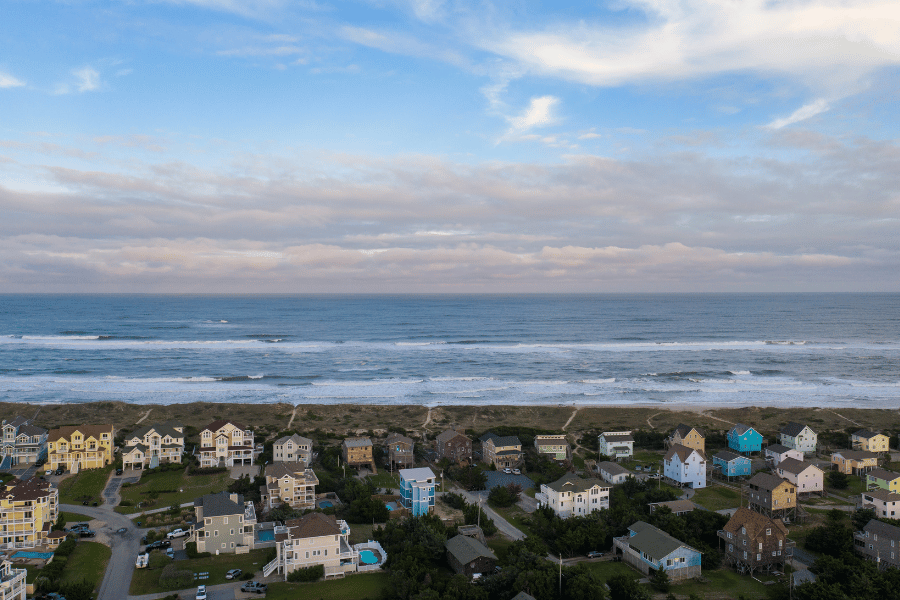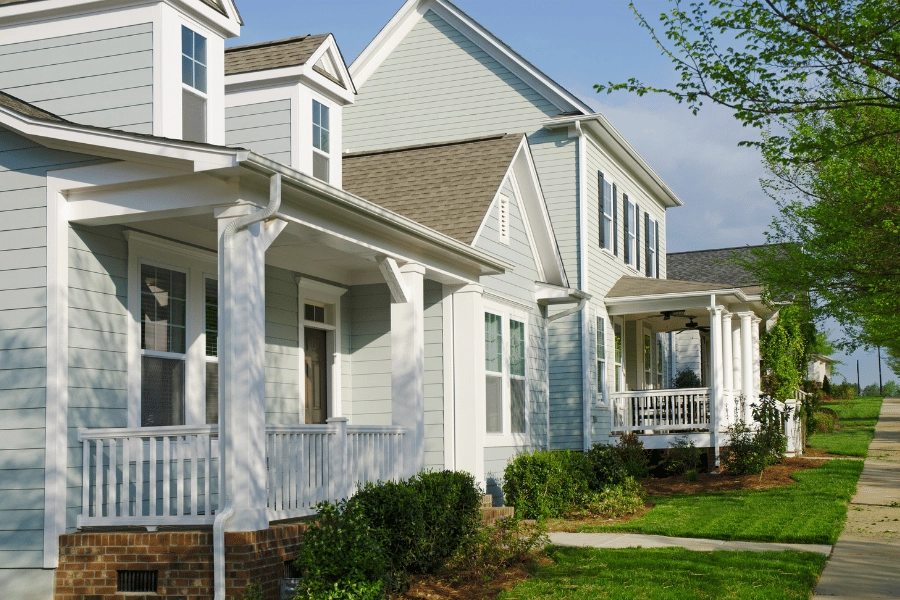Retiring in NC
Do you want to retire in North Carolina? Here is what you need to know about retiring in NC, with pros and cons.
North Carolina has become one of the most attractive retirement destinations in the United States, and for good reason. From the majestic Blue Ridge Mountains to the pristine Atlantic coastline, the Tar Heel State offers retirees an unbeatable combination of natural beauty, affordable living, excellent healthcare, and a welcoming community atmosphere.
Whether you dream of mountain views or beachfront sunsets, North Carolina provides the perfect backdrop for your golden years. The full retirement age is 66, but you can start receiving your Social Security retirement benefits as early as 62.
If you are about to retire or are already enjoying your retirement years, you might be considering the best places to retire and how to spend your retirement. From lively cities to peaceful suburbs, there are more than enough options when searching for a retirement community or relaxing neighborhood to call home.
North Carolina is one of the top states people are moving to for retirement, and it is no surprise why. It offers many benefits that retirees can take advantage of.
If you are thinking about moving to North Carolina, you should consider many things, from the cost of living to healthcare. North Carolina is a great financial choice for retirement and provides the convenience, safety, and ideal climate most retirees seek.
This is what you need to know about retiring in NC.
1. Diverse Housing Options
North Carolina offers retirees an exceptional variety of housing options to match any lifestyle preference or budget. From luxury active adult communities to charming small-town homes, the state provides choices many other regions cannot match.
For those preferring traditional neighborhoods, established areas like Raleigh, Charlotte, and Asheville offer mature trees, walkable communities, and proximity to cultural amenities. Many of these neighborhoods feature homes with character and history at reasonable prices.
The state's favorable real estate market means housing costs remain reasonable compared to other popular retirement destinations, allowing retirees to get more value for their investment.
2. Affordable Cost of Living
Ranking number 24 on a list of the most affordable states in the country, North Carolina is a relatively cheap place to live and ultimately retire. With a cost of living slightly below the national average, it is no wonder that so many young families and retirees are moving here.
The cost of living in North Carolina is not as expensive as in other areas, but it is not the least costly option. Still, its housing costs are 14% lower than the national average, making it a top choice for homebuyers.
Considered an excellent state for retirees, many individuals and couples of retirement age choose to call North Carolina home for its affordability alone. Though housing costs vary widely in the state, there are certainly more affordable cities to live in than others, depending on what you are looking for in retirement.
The capital city of Raleigh is a growing area that offers many affordable neighborhoods and numerous up-and-coming neighborhoods to fit many different lifestyles.

3. Moderately Tax-Friendly State
Taxes are a significant factor when retiring, and North Carolina offers specific tax benefits that may be appealing. Considered a moderately tax-friendly state, North Carolina does not tax Social Security retirement benefits from income taxes. North Carolina also has no inheritance, estate, or military retirement benefit taxes.
Conversely, withdrawals from retirement accounts and private and pension income are fully taxed. All wages and other forms of retirement income are taxed at the normal state income tax rate of 4.25%. This flat tax structure makes financial planning straightforward and predictable.
For seniors, additional tax benefits include increased standard deductions of $2,000 for single filers or head of household, and $1,600 for married filing jointly for those 65 or older. Property taxes remain reasonable throughout most of the state, with rates varying by county but generally staying below national averages.
4. Excellent Healthcare
If you are considering living in North Carolina and weighing the pros and cons, its excellent healthcare is a pro. Home to some of the best hospitals and doctors in the country, patients will always be in good hands.
Duke University Hospital, located in Durham, part of the Research Triangle, is the number one best hospital in North Carolina since it is nationally ranked in ten specialties and ten children's specialties. UNC Hospitals in Chapel Hill is ranked at number two for its national rankings in three specialties and nine children's specialties.
Wake Forest Baptist Medical Center, Novant Health, and Atrium Health provide comprehensive care networks throughout the state. These systems offer specialized geriatric care, cutting-edge cardiac services, cancer treatment centers, and rehabilitation facilities specifically designed for older adults.
While the healthcare options are top-rated, North Carolina is unfortunately ranked as one of the worst states for healthcare costs. The state has large regions that only offer a few major healthcare providers, and the lack of competition and increased demand drive up the cost of care.

5. Ideal Climate
North Carolina's diverse geography gives retirees climate options to suit every preference. The state enjoys four seasons without the harsh extremes of many other regions. This climate diversity means you can choose your ideal environment in North Carolina, from beachfront living to mountain retreats.
North Carolina has a humid subtropical climate, meaning the summers are warm and the winters are mild. Many retirees from New York, Pennsylvania, and other parts of the Northeast are moving to North Carolina for its warmer weather and moderate climate.
With the Appalachian Mountains to the West, the Piedmont Plateau in the central region, and the Coastal Plain to the East, the weather will vary depending on where you decide to retire in the state, but not by much.
Though the mountains of North Carolina tend to get colder during the winter and receive more snow than the rest of the state, several cities, including Raleigh, Wilmington, Lumberton, and Hatteras, tend to have warmer years.
Average annual temperatures range from 66 degrees Fahrenheit near the coast to 60 degrees Fahrenheit in the central region and 55 degrees Fahrenheit in the mountains. If you decide to spend your retirement living in Raleigh, expect to enjoy all four distinct seasons throughout the year.

6. Breathtaking Natural Beauty
Why not spend your retirement surrounded by stunning natural beauty? North Carolina is a special state since it offers three distinct regions: the Piedmont, the coast, and the mountains.
North Carolina's natural diversity is unmatched, offering retirees endless opportunities for outdoor recreation and scenic beauty. The state encompasses everything from the highest peaks east of the Mississippi River to pristine Atlantic beaches.
Raleigh is centrally located and is a popular destination as the home of Research Triangle Park. The nearest beach is within a two-hour drive, and Asheville and the mountains are within a four-hour drive.
The Piedmont is home to many welcoming and relaxing lake communities where retirees can go fishing, boating, or simply experience luxury lakefront living. This region offers rolling hills and state parks for hiking, fishing, and camping. Jordan Lake, Falls Lake, and High Rock Lake offer water recreation just minutes from major metropolitan areas.
Home to some of the best beaches, retirees love to relax on the coast. Wrightsville Beach is the closest beach to Raleigh, but the Outer Banks are only three hours away and are a sought-after location for their quiet beaches, spectacular sunsets, and friendly residents.
On the other end of the state lies the mountains, which offer retirees the chance to explore and spend time in nature. Home to some of the best ski resorts on the East Coast and breathtaking views, it is no wonder many residents stay here for retirement.

7. Safe Neighborhoods
Safety is a top consideration for people when moving, especially for retirees. Much like you want to consider the climate, it is essential to research an area's crime rate and other related statistics before deciding on a place to live.
The most common crimes committed against the elderly are burglary, robbery, and fraud. North Carolina has many safe places that retirees would feel comfortable calling home.
North Carolina is one of the safest states in the country. Many areas consistently rank among the safest communities in the nation, with low crime rates and strong community engagement. Raleigh and its surrounding towns, including Holly Springs, Cary, and Apex, are safe places to live.
Even larger metropolitan areas like Raleigh, Charlotte, and Greensboro offer safe suburban neighborhoods with active retiree populations. Many areas feature neighborhood watch programs, community policing initiatives, and senior-focused safety programs.
Here are the property crime rates vs. violent crime rates in North Carolina:
| Your Chance of Becoming a Victim of Property Crime | Your Chance of Becoming a Victim of Violent Crime |
| One in 48 | One in 256 |
*Data sourced from NeighborhoodScout.
8. Well-Maintained Highway Systems
North Carolina has one of the largest state-maintained highway systems in the country, and it is easy to get around. Its vast network of interstates includes 36 US highways that exist entirely or partially in the state.
The North Carolina Division of Highways maintains more than 80,000 miles of roadway in the state. Its job is to build new roads and relay travel information and commute times. The longest highway in North Carolina is U.S. Route 64, which will take drivers from the Tennessee border to the Outer Banks.
There are also four international airports in the state for retirees who want to travel and see the world. These airports are the Raleigh-Durham International Airport, Charlotte-Douglas International Airport, Piedmont Triad International Airport, and Wilmington International Airport.
Even though Raleigh does not offer many public transportation options, residents can take advantage of public bus routes, an Amtrak passenger service, and coastal ferries. Luckily, public transportation options continue expanding, particularly in metropolitan areas.
9. World-Renowned Golf Destinations
Golf is the perfect sport for retirement since it is low-impact and provides an enjoyable activity for all ages that offers social, physical, and mental benefits. While choosing to retire does not mean you have to buy a pair of golf clubs immediately, North Carolina is home to some of the best golf courses in the country that welcome thousands of visitors and players each year.
Considered a golfer's paradise, North Carolina offers some of the finest courses in the world. It is home to over 500 golf courses, ranging from championship layouts to affordable municipal courses. The Sandhills region around Pinehurst and Southern Pines features over 40 courses within a 15-mile radius.
Some of the best neighborhoods in Raleigh and the state are golf communities that offer affordable tee times. Whether you are an experienced golfer or just learning to play, most courses provide challenging and fun play for all levels.
Pinehurst Resort is located in North Carolina and is almost an hour and a half drive southwest of Raleigh. Pinehurst is notorious for its golf and is home to the famous course Pinehurst No. 2, which Donald Ross designed, and is where the U.S. Open Championship will occur in June 2024.
Many golf communities cater specifically to retirees, offering real estate options directly on or adjacent to courses. These communities often include clubhouses, pro shops, and golf-related social activities.

10. Vibrant Arts and Culture
North Carolina offers a vibrant arts and cultural scene, as seen through its many museums and art galleries scattered around the state. If you are going to retire, then you need to make sure that you will have things to do and will find ways to enjoy them.
The North Carolina Museum of Art in Raleigh houses one of the premier art collections in the Southeast, while the Bechtler Museum of Modern Art in Charlotte showcases contemporary works. Smaller cities like Asheville have developed vibrant arts districts with galleries, studios, and craft centers.
No matter what city in the state you decide to call home, retirees can enjoy film festivals, live music, theater productions, dance performances, and orchestra productions. There are also many volunteering opportunities available to get involved in the community.
11. Access to Education
Just because you are retired does not mean that you should stop learning new things. Many of the top-rated colleges and universities in North Carolina offer senior citizens over 65 the ability to audit courses for free.
The University of North Carolina system includes 16 campuses offering continuing education and audit programs for seniors. State community colleges provide classes, workshops, and social opportunities designed explicitly for retirees.
Pros and Cons:
Pros:
- Affordable cost of living
- Moderately tax-friendly
- Excellent healthcare
- Ideal climate
- Natural beauty
- Safe neighborhoods
- Well-maintained highway systems
- Golf courses
- Vibrant Arts and Culture
- Access to education
Cons:
- Higher healthcare costs
- Not many public transportation options
- Increased risk of hurricanes and natural disasters
- Withdrawals from retirement accounts are fully taxed
Methodology
We used information and data to determine the top things to know about retiring in North Carolina from the following sources:
- U.S. News and World Report
- Raleigh News and Observer
- Britannica
- The Office of Justice Programs
- The North Carolina Department of Transportation
FAQs
Is North Carolina a good state for retirement?
North Carolina is one of the best places to live in the country and is considered a great state to retire in. It offers a lower cost of living, lower tax rates, beautiful weather, and a high quality of life.
Is North Carolina tax-friendly to retirees?
North Carolina is known to be moderately tax-friendly for retirees since social security income is not taxed, but withdrawals from retirement accounts are fully taxed.
Is it cheaper to retire in NC or SC?
Even though North Carolina and South Carolina offer some of the same amenities and perks, it is slightly cheaper to retire in South Carolina since it has a lower cost of living.
How much money do you need to retire comfortably in North Carolina?
While some states are either cheaper or more expensive to retire in, to retire comfortably in North Carolina, it is recommended that an individual have $63,156 annually.
Your Next Chapter Awaits in North Carolina
North Carolina combines all the elements that make for an ideal retirement destination: financial advantages through tax savings, affordable cost of living, excellent healthcare, beautiful natural settings, safe communities, rich cultural opportunities, and diverse housing options.
Whether you're drawn to mountain vistas, coastal sunsets, or vibrant city life, North Carolina offers the perfect setting for your retirement years. The state's welcoming atmosphere and practical advantages create an environment where retirees can genuinely thrive.
Spending these best years of life should be somewhere pleasant and relaxing, and this Southeastern state offers just that and more. If you are ready to call beautiful North Carolina home, contact the experts at Raleigh Realty. We are here to help and answer any questions.




